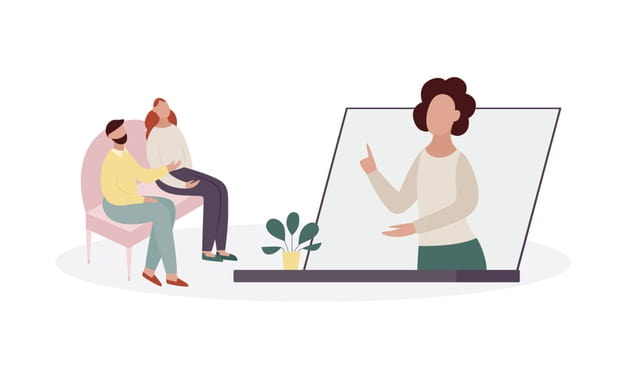In an increasingly interconnected world, the nuances of human relationships are evolving. The age-old struggles of connection, communication, and comprehension have found a new playground – the digital domain. With many of us spending hours online, it’s no surprise that we are seeking guidance for our relationships there too. In this blog post, we will discuss relationship psychologist online, understand their importance, and how they are reshaping our interpersonal dynamics in the age of screens and pixels.
Contents
Is It Okay To See A Psychologist For Relationship Issues?
 Absolutely. Seeking the assistance of a psychologist for relationship issues is a proactive and commendable step. Whether you’re facing challenges with communication, trust, intimacy, or any other relational concern, psychologists are trained to offer guidance, tools, and strategies. All this is to help individuals and couples navigate complex emotional terrains. They provide a safe and confidential space where concerns can be discussed openly. And, helping to foster understanding and offering solutions tailored to specific relationship dynamics.
Absolutely. Seeking the assistance of a psychologist for relationship issues is a proactive and commendable step. Whether you’re facing challenges with communication, trust, intimacy, or any other relational concern, psychologists are trained to offer guidance, tools, and strategies. All this is to help individuals and couples navigate complex emotional terrains. They provide a safe and confidential space where concerns can be discussed openly. And, helping to foster understanding and offering solutions tailored to specific relationship dynamics.
Moreover, seeing a psychologist doesn’t imply that there’s something inherently “wrong” with the individuals involved or their relationship. Instead, it signifies a commitment to understanding, growth, and the betterment of the relationship. Just as one might consult a doctor for physical wellness, consulting a psychologist for relationship well-being is both wise and beneficial.
What Are The Benefits Of Relationship Psychologists Online?
A relationship psychologist online offers a multitude of benefits tailored to the digital age. Here are some of the key advantages:
- Accessibility: Online platforms make it easier for individuals and couples to access qualified psychologists, regardless of geographical constraints. This is especially beneficial for those living in remote areas or where in-person services are limited.
- Convenience: Sessions can be scheduled around your availability, eliminating the need for commutes and allowing therapy from the comfort of your home.
- Anonymity and Privacy: For those who might feel apprehensive about seeking therapy due to social stigma or privacy concerns, online platforms can provide a more discreet option.
- The flexibility of Medium: Clients can choose between video calls, phone sessions, chat, or even email, selecting the mode of communication that they’re most comfortable with.
- Wide Range of Specialists: Online platforms often host a vast array of therapists with diverse specialties. So it allows individuals and couples to find a professional with expertise tailored to their specific concerns.
- Continuity of Care: For those who travel frequently or relocate, online therapy ensures that they can continue sessions with the same psychologist without interruption.
- Comfort and Familiarity: Being in one’s own environment can help some individuals feel more at ease. And, facilitating open communication and vulnerability.
- Global Perspectives: The ability to access therapists from different parts of the world can offer fresh perspectives and varied techniques. This can be particularly useful for intercultural couples or those looking for a diverse viewpoint.
While in-person therapy has its unique benefits, online relationship psychology has emerged as a viable and effective alternative, particularly in our rapidly digitizing world.
What To Expect From A Relationship Psychologist?
 Seeing a relationship psychologist can be a transformative experience, whether you’re seeking individual insights about relational patterns or attending with a partner. Here’s what you can generally expect:
Seeing a relationship psychologist can be a transformative experience, whether you’re seeking individual insights about relational patterns or attending with a partner. Here’s what you can generally expect:
- Professional Assessment
The psychologist will conduct an initial assessment to understand the dynamics of your relationship, the challenges you face, and your goals for therapy. This might involve answering questions about your relationship history, personal background, and communication patterns.
- Safe and Neutral Environment
A relationship psychologist provides a neutral, non-judgmental space where both parties can feel heard and understood. They act as a mediator, guiding conversations and ensuring they remain productive.
- Skill Building
The psychologist will introduce and teach communication skills, conflict resolution strategies, and other techniques tailored to your specific needs. This is to equip you with the tools necessary to navigate challenges more effectively.
- Insight and Awareness
Expect to gain insights into your behavior, feelings, and thought patterns. The therapist will often help you identify negative patterns or cycles and understand their origins, such as past traumas or learned behaviors from family dynamics.
- Homework and Practical Tasks
Many relationship psychologists assign “homework” – exercises or tasks to practice between sessions. This could be as simple as practicing a communication technique, reading a relevant book, or engaging in activities to rebuild trust and intimacy.
- Feedback and Reflection
The psychologist will provide feedback on your interactions and help you reflect on your behaviors and feelings. This can facilitate deeper understanding and foster change.
- Endings and Follow-ups
Once the therapy goals are achieved, or significant progress is made, the psychologist might recommend reducing the frequency of sessions or concluding them altogether. They often provide strategies for maintaining progress and might suggest periodic check-ins or follow-up sessions.
Remember, the journey with a relationship psychologist is collaborative. It requires active participation, honesty, and a willingness to engage in self-reflection and change. While it can be challenging at times, the insights and growth achieved can lead to more fulfilling and healthier relationships.
How To Choose The Right Relationship Psychologist Online?
 Choosing the right relationship psychologist online is crucial to ensure you and your partner receive the best possible guidance and support. Here are some steps and considerations to guide your decision:
Choosing the right relationship psychologist online is crucial to ensure you and your partner receive the best possible guidance and support. Here are some steps and considerations to guide your decision:
- Credentials and Licensing: Ensure the psychologist is licensed in their respective country or state and has credentials from recognized institutions. Their license should be current, and you can often verify this through professional boards or licensing organizations.
- Specialization: While many therapists might offer relationship counseling, it’s beneficial to select someone who specializes in couples or relationship therapy. They will have more extensive training and experience in handling the nuances of interpersonal dynamics.
- Therapeutic Approach: Psychologists may adopt various therapeutic models like Cognitive Behavioral Therapy, Emotionally Focused Therapy, Gottman Method, etc. Familiarize yourself with these approaches and consider which might resonate most with your situation.
- Reviews and Recommendations: Check for reviews or testimonials from previous clients. Word of mouth or recommendations from trusted friends or family can also be invaluable.
- Availability and Flexibility: Ensure the psychologist’s availability matches your schedule. The platform should also offer flexibility in terms of communication, whether through video calls, chats, or phone sessions.
- Privacy and Confidentiality: The online platform used should adhere to strict privacy guidelines and use end-to-end encryption to protect your information and conversations.
- Cost and Insurance: Understand the fees involved and whether they fit within your budget. If you have insurance, check if online therapy is covered and if the psychologist can provide the necessary documentation for reimbursement.
- Personal Fit: Beyond qualifications and logistics, the “fit” between you and the therapist is crucial. You should feel comfortable, understood, and safe. Trust your instincts and feelings during initial interactions.
- Clear Communication: The psychologist should set clear expectations regarding the therapy process, frequency of sessions, and means of communication between sessions.
Choosing the right online relationship psychologist can take time, but the effort ensures a more effective and rewarding therapeutic experience. Remember, the goal is to find someone with whom you can build a trusting, collaborative relationship to work through challenges and enhance your relationship’s well-being.
Conclusion
Navigating the digital landscape of relationship therapy may initially seem daunting, but with the right guidance, it can be a transformative journey. Opting for online therapy offers unprecedented convenience, flexibility, and a vast array of resources right at our fingertips. By taking the time to choose a qualified and compatible relationship psychologist, individuals and couples can effectively address challenges, deepen their understanding of one another, and foster stronger, healthier relationships.
In an ever-evolving digital age, the fusion of technology and therapy promises a brighter future for relationships worldwide. A psychologist is a professional who specializes in the study of human behavior and mental processes. If you have any queries regarding online therapy experienced therapists at TherapyMantra can help: Book a trial Online therapy session


